
Emil A. and Jenny Fish Center for Holocaust and Genocide Studies
Opening New Doors:
Teaching
the Next Generation of Holocaust Education






Teaching




The Emil A. and Jenny Fish Center for Holocaust and Genocide Studies strives to build a cadre of professionals and lay leaders who are committed to Holocaust Education and Remembrance, and ready to meet the challenges that the field is facing.
As survivors pass away and awareness of the subject in public memory fades, it is the responsibility of the next generations to explore, research and teach the history of the Holocaust and its lessons, confront Holocaust deniers and distorters, and combat antisemitism both in the U.S. and globally.


Thank you for your interest in the mission and activities of the Emil A. and Jenny
As the founding director of an institute that has become my home for the past five years, I know that without the support of students, donors, and community members like you, it would not have been possible to accomplish so much in so little time. We have created yesh meayin (ex nihilo, as they say in Latin) a home for Holocaust education at Yeshiva University and the much-needed platform for teaching about this consequential subject in a fashion, and from a perspective, steeped in the experiences of those most impacted by the Holocaust – the Jewish people.
If you had asked me a decade ago why it is important to teach about the Holocaust in a way that places Jews as active, rather than passive, participants, I could have given you quite a few reasons. The history of the Holocaust is the most difficult chapter in the annals of our ancient people, and we must own it. And it is far more than an exclusively German story – of National Socialism, of Hitler’s coming to power, of the planning, launching, and perpetrating of the Final Solution.
A decade ago, though, as a young professional in this field, while agreeing that the Shoah is, and should be, our story, I would have argued that the universal legacy of the Holocaust should have value equal, or close to equal, to that of the particular Jewish story. I thought to myself then that, yes, this is our narrative, but let us not forget man’s inhumanity to man, the crime of crimes called genocide, the history of racism, and the general call for tolerance and mutual understanding among different ethnic and faith groups. This was no longer 1945, peace in the
Middle East seemed more imminent than ever, and America, my new home, was home to a Jewish community that was thriving, strong, and fully integrated into society.
Then the terrible massacre of over 1200 Israelis took place on October 7th – the largest mass murder of Jews to have taken place since the Holocaust. Some of the same brutal scenes of murder, rape, and pillage that we have all read about from Czarist times, some of the same black-and-white images we have all been familiar with from Holocaust-era pogroms in places like Lvov or Kovno, were now televised in 2023 in gruesome detail. It has affected us all. It is hard to find Jews closely connected to Israel who don’t know, directly or indirectly, a victim of Hamas terror.
While, fortunately, the Simchat Torah massacre cannot be compared to the pogroms of 1881-1882 or the years of European Jewry’s destruction, what October 7th has done is to vividly project, on a global scale, how vulnerable and fragile Jewish life can be. And although by October 7th the Fish Center was already a robust program with dozens of MA students and a new advanced teacher certificate, we – the center’s staff, faculty, and students-- are not the same people we all were on October 6th of last year.
From the tragedy we endured, I have no doubt that the state of Israel, American and world Jewry, and the Yeshiva University community, G-d willing, will emerge victorious, more robust, dynamic, and stronger than ever. We know we have no choice but to recover from these excruciatingly difficult days and help rebuild what has been destroyed.
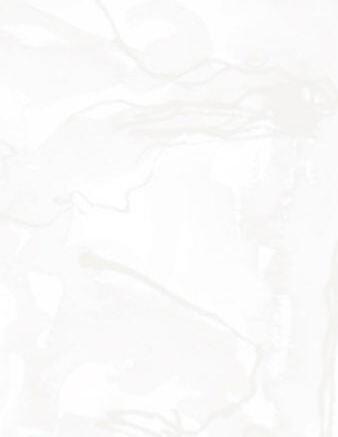
It is hard to believe that close to 80 years after the liberation of Auschwitz, the Jewish people find ourselves feeling, if not facing, an existential threat. Our reaction should be, and I trust you agree, to teach more robustly about the perils of antisemitism, to preserve and further engage in studying the histories and memories of the Holocaust, and to ensure that this dark yet critical chapter in the history of our people and of humanity will never be forgotten or lost to posterity. Our students, who are of various ages and ethnic and religious backgrounds, have told us that they have joined our program to learn the Jewish account, the agency and actions of our people during that time. They know the Nazi narrative; they understand, as we all do, the universal, humanistic value of education about the Holocaust as a part of a grander call to make the world a better place. But they came to learn about the Holocaust in a way that places its Jewish dimension front and center. The history of the Holocaust is our story and at the Fish Center we reclaim, embrace, and make it central to our teaching.
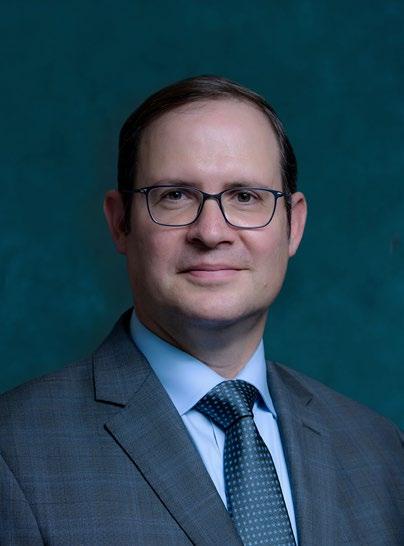
Dr. Shay Pilnik
As a grandson of four Holocaust survivors, Elli Klapper was connected to the Holocaust before he was born. His grandparents were all warm and loving, but he was especially close with his mother’s father, Jack Breitkopf, z”l, and his mother’s mother, Rosel, z”l. Jack had endured years in multiple concentration camps, including Auschwitz-Birkenau, and was the sole survivor of his family. Rosel survived in England, a child of the Kindertransport. Jack served as a strong role model and mentor with profound influence on Elli’s life.
Elli grew to become a successful businessman, but he knew the importance of lifelong learning. As a husband and the busy father of five daughters, returning to university to pursue a Master’s degree was not an easy decision, but it was important to him. He chose the Emil A. and Jenny Fish Center for Holocaust and Genocide Studies to learn more about the history of his grandparents’ experiences and those of other Jews.
To Elli, the program “opened my eyes to a world I knew existed but did not know a lot about.” Not only has it given him a wealth of knowledge and understanding, but it has also served as a way for him to continue to connect with his grandfather, who passed away prior to his educational journey.
Embarking on the Master’s program, Elli maintains, was one of the best decisions of his life. Along with the learning, he especially values the Fish Center student community, diverse in age, religion, race, and background and yet like-minded in their educational goals, and the combination of serious discussion and camaraderie he finds in each class.
To honor his grandparents, Elli and his wife, Ashley, have funded a scholarship to support Yeshiva University and the Fish Center. The Jack and Rosel Breitkopf Scholarship is designed to make the Advanced Certificate in Holocaust Education accessible and affordable to any history, social studies, or language arts teachers in grades 6-12 who are seeking to learn how to teach about the Holocaust in a historically accurate and age-appropriate manner.
With the extreme rise in antisemitism after October 7th, Elli emphasizes the urgency of learning about this watershed. “We need to step up in teaching middle and high school students to combat what they’ll hear” about denial, distortion, and misinformation, he believes. Speaking to teachers, he explains, “You have more of an obligation than you even realize. Invest in your ability to teach about the Holocaust properly from the perspective of the Jews who experienced it. Through your teaching, you have the opportunity to impact in a positive way the future of American Jews.”



March 2023:
Yad Vashem and the Fish Center announced its teaching partnership, with educators from Yad Vashem to teach in the fall and spring, to Advanced Certificate students.
July 2023:
A study abroad to Europe brought Fish students through eastern Europe as they learned of Jewish civilizations before, during, and post the Holocaust.
September 2023:
Founding Advanced Certificate cohort begins Conferences and Publications.
July 2024:
Fish Center MA and Advanced Certificate students traveled to Israel to learn about the Israeli landscape of Holocaust education in a post-October 7th world.
Spring 2023:
Holocaust in Lithuania spring series airs, probing what Jewish life looked like before the Holocaust and what Holocaust memory means today through its literary and artistic representations, featuring writers, thinkers, and artists from Lithuania and the US.
January 2024:
Distorted podcast launched, asking the question, “What is Holocaust distortion? And how does it affect collective memory?”
Spring 2024:
Prism #14 is published; the issue intertwines personal narratives on the impact of October 7th on the authors with poetry and essays on the Holocaust.
July 2024:
Fish Center co-sponsored a conference Bridging Divides: Jews in Historical Lithuania at Vilnius University; it featured about 20 presentations over 2 days, with presenters evenly split between American and Lithuanian institutions.
October 2024:
A limited run of Prism is created to mark October 7th. It contains one poem and 10 short essays written by our students who accompanied us on our summer study learning experience in Israel in July 2024.

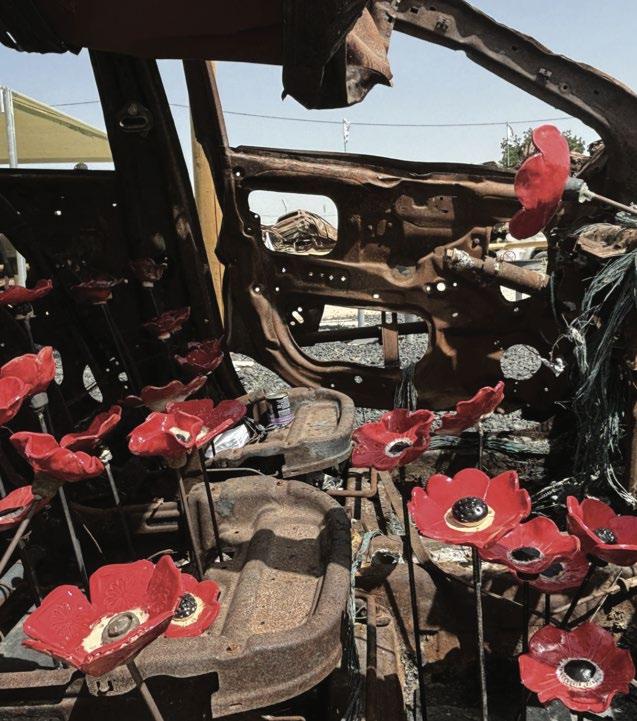


March 2023:
Fish Center Gala is held in Santa Monica, California
February 2024:
Student excursion to the United States Holocaust Memorial Museum
March 2024:
Fish Center hosts Bret Stephens for a conversation about the future of Jewish life in America and how the importance of Holocaust education is tied to it all.
May 2024:
Mr. Fish an Honorary Doctorate of Humane Letters at Yeshiva University’s 92nd Annual Commencement
June 2024:
Current student Annie Squicciarini organized a schoolwide testimony event from Mr. Emil Fish at a Catholic school in Brooklyn, NY
August 2024:
Dr. Glenn Dynner presented the larger public with a Tisha B’Av book talk, “Destruction & Reconstruction: The Story of Polish Hasidim and the Holocaust”
September 2024:
Fish Center co-sponsored The Courage to Create: Addressing the Holocaust through Art, focusing on Shoshana Comet’s survival and art




Relying on the resources and faculty of one of the world’s premier Jewish institutions for higher education, the M.A. in Holocaust and Genocide Studies presents a new interdisciplinary lens through which the Holocaust is viewed as an event impacting all aspects of the human experience; an unprecedented event, fully deserving of investigation that cuts across a myriad of academic disciplines.
Focusing on the murder of six million Jews and millions of others by Nazi Germany and its collaborators, our students study this watershed event in conjunction with other genocides that have occurred since the early 20th century. For all these dark chapters of history, the Masters program offers a broad survey and profound analysis of their antecedents, root causes and evolution, and analyzes their social, political, philosophical and theological ramifications. Concomitantly, as we look at the aftermath of the Holocaust and other genocides, students investigate their impact and the role they each play in public memory as well as their artistic and literary representations.
The Fish Center prides itself on its diversity of students. We strive to cater to a multitude of time zones and schedules by offering both day and night classes and personalized thesis coursework.
• 40+ unique courses offered to date
• 12+ courses offered per year
• Synchronous and Asynchronous classes
• Interdisciplinary instruction model
The Advanced Certificate in Holocaust Education is uniquely designed for public and private school educators, administrators, and librarians in grades 6-12 who seek effective, age-appropriate methods and materials for teaching about the Holocaust.
Yeshiva University has the expertise in Holocaust studies and pedagogy to effectively and sensitively teach about what must be the foundation of Holocaust education: the Shoah from the perspective of the Jews who experienced it. Only in doing so will the next generation be able to build on an introduction to the multi-faceted Jewish communities and cultures that existed before they were destroyed and on an understanding of Jewish agency, resilience, defense, and defiance.
• 12 Credits
• One-credit modules
• Taught by scholars from the US, Canada, and Israel
• Modules address the Shoah in a variety of disciplines
Our programs are designed to suit students’ academic and professional needs, with courses spanning a multitude of academic fields to foster a robust and multi-faceted understanding, the Fish Center is dedicated to the study of the Shoah from a perspective steeped in the history, culture, religion, and spiritual life of the Jewish civilization annihilated by the Nazis and their collaborators.





This academic year, the Fish Center was proud to launch a brand new program of graduate study, an Advanced Certificate in Holocaust Education.
In its first semesters, we have welcomed public and private school classroom teachers from across the United States and provided them with the tools they need to teach the Holocaust in 6-12th grade settings.
See what our students have to say about their coursework in the Advanced Certificate program:
“Taking this course has already improved the ways that I approach teaching the Holocaust to my students. The instructor cared so much about the topic; their style and passion pushed me to care even more than before! Tremendously motivating.”
“I learned so much and loved the play between history and pedagogy.”
“This course’s instructor was so knowledgeable, creative, affirming, and committed to the individual integrity of each student. A great class and the resources introduced have already been useful in my classroom.”
“The lectures are very detailed, well-informed, and relevant to what I need as a high school teacher to improve my epistemological and pedagogical choices.“
Following one week of preparatory study, students traveled through central Europe with Dr. Shay Pilnik, visiting sites of the Holocaust in Czechia, Austria, Slovakia, and Poland.
The course investigated pre-war Jewish life, pre-war political crises, and the Holocaust in Czechoslovakia, Austria, and southern Poland. MA students got the unique opportunity to engage with the Jewish culture that was lost in the Shoah; the political challenges and changes faced both by Jews and the national governments as the Nazis sought lebensraum both through negotiation (i.e. the Munich pact) and aggressive territorial expansion; and the annihilation of Jewish life in these places. Their summer experience gave our future leaders in the field the chance to consider in real time the post-war issues of memory and preservation, as well as the rise of extremist politics today.
• “It’s one thing to learn about the Holocaust through books and movies, but it was very impactful to actually stand where it took place. This was an incredible experience and I am grateful for the opportunity.”
• “Not only did I learn from the scholars and local experts, but we learned from each other. I now know so much more than I did.”
• “This course was life-changing and in many ways, defies description.”
During the 2024 summer-study seminar, Fish Center students investigated Holocaust museums and resource centers around Israel to learn the different philosophies and methodologies each uses to teach about the Holocaust.
Students met educators from these institutions and examined their exhibitions, all the while critically analyzing if and how October 7th has changed their approach to teaching about the Shoah, and discussing political challenges and changes faced both by the administrators and their audiences. Finally, participants considered post-October 7th war issues of memory and preservation and how, if at all, they color or intersect with Holocaust memory and preservation.
• “The museums and educational institutes we visited were enlightening and brought a unique perspective on the future of Holocaust education.”
• “This study abroad in Israel was the most important trip of my life. Now, more than ever, the words Am Israel Chai live within me.”
• “We learned from dedicated and passionate educators how each museum honors the memory of the Shoah, those who died, and those who survived. We learned how ghetto fighters rebuilt their lives and a vibrant, vital kibbutz. We learned how, since 1948, Israel was able to thrive amid so much adversity.”
• “Despite the darkness, there is always a place for hope.”

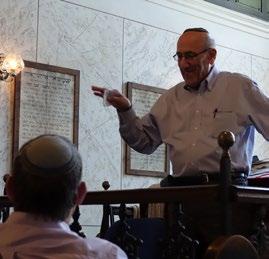













The Fish Center traveled to Washington D.C. for a Fish Center-exclusive tour of the USHMM permanent exhibit and afternoon lectures Dr. Lisa Moses Leff, Director, Mandel Center for Advanced Holocaust Studies at USHMM and Professor of History at American University and Ben Holt & Paul Kutner: Ph.D Students in History at American University.
Our dedicated students converged from all around the country to make this outing possible. The tour of the museum allowed us to capture and consider the narrative of the Holocaust as presented by the United States government, as well as understanding what Americans and tourists to DC take away from their trip to this US cornerstone institution of memory.
• “Thank you for the opportunity to visit USHMM, learn, and grow. I feel fortunate to be a part of this fantastic program.”
The massacre of over 1,200 Israelis by Hamas terrorists, together with the kidnapping of at least 240 hostages, was a terror attack of unimaginable brutality and the deadliest anti-Jewish attack since the Holocaust. It has triggered a military conflict in the Middle East on multiple fronts and unleashed an antisemitic tide of unprecedented nature in the U.S. and around the world. The Fish Center hosted a fascinating conversation with award-winning journalist Bret Stephens about the deeper meaning of this historic moment, about the future of Jewish life in America and how the importance of Holocaust education is tied to it all.






A curator-led tour of the exhibition Tapestries by Shoshana Comet: From Survival to Strength was followed by a panel of scholars in conversation with Dr. Shay Pilnik. The subsequent thought-provoking discussion referenced the tapestries to explore artistic representation of the Holocaust, the use of art to record and preserve history, and art as a means of recovery from trauma. Panelists included Archie Rand, Artist and Presidential Professor of Art at CUNY - Brooklyn College and Dr. Ori Z. Soltes, Teaching Professor at the Center for Jewish Civilization at Georgetown University. The event was co-produced by the Yeshiva University Museum.
Distorted: The Uncoordinated Campaign Against Holocaust History & Memory - A Fish Center Podcast September 2023
What is Holocaust distortion? Unlike Holocaust denial, a subject with a clear definition and clearer characteristics – the lie that the most well-documented atrocity in history did not happen – the crime of distorting the Holocaust may seem much subtler, lighter. But is that truly the case? Can we so easily respond to those who agree that the Holocaust happened, but dispute the context, magnitude, and legacy?
Join Holocaust educator Paul Kutner and distinguished guests from around the world for a fascinating exploration of the risks inherent to this new, global danger to Holocaust remembrance and education.
A co-production of the Emil A. and Jenny Fish Center for Holocaust & Genocide Studies, the Rabbi Lord Jonathan Sacks-Herenstein Center for Values & Leadership, and the Rabbi Arthur Schneier Program for International Affairs, ‘Distorted’ seeks to expose and discuss issues of Holocaust distortion and combat against this growing trend.

Original music and sound design by Moshe Bonen of Lumax Music
This year, with our thoughts on the events in Israel and with a July summer study class there, we published two issues of ‘PRISM: An Interdisciplinary Journal for Holocaust Educators’
The first one, our 14th issue, was published in late spring, and was very different from any previous issues because the world is so different. October 7th and the aftermath wrought profound changes that touched and continue to affect many of us daily. As a result, we chose to include in that issue some 10 essays, brief personal narratives on the impact of October 7th. The rest of the issue, as usual, contains poetry and essays on the Holocaust. You may draw comparisons; you may hear echoes; you may note the tragic similarities between the two events that so grievously wounded our people. But you will see also the resilience, the courage, the faith, and the determination to overcome—“we will dance again’’—that are hallmarks of our people and of our homeland, our Eretz Yisrael.
The week of September 16th saw the online-only publication of a limited edition of the journal to mark the first anniversary of October 7th. It contains only one poem and 10 short essays written by our MA and Advanced Certificate students who accompanied us on our summer study learning experience in Israel in July. We chose to keep this issue spare and brief in recognition of and respect for those who feel that a commemoration is not appropriate while this war is ongoing and our hostages are still not home. The families and friends of those kidnapped and those murdered have not had a chance to grieve; this atrocity is not over for them. The war is not over for Israel, and soldiers are still dying as they fight. October 7th, with its aftermath, is not over for any of us. Ayala Metzger, the daughter-in-law of murdered hostage Yoram Metzger, said, “During the Holocaust, there were no ceremonies.”
But we wanted to have a record of our study in Israel, both for the students who participated and for our readers around the world.
In our summer study learning, our Fish Center students earned three graduate credits, and by all accounts the experience will stay with them forever. We visited six Holocaust museums and centers to learn how Israeli educators were teaching about the Shoah in the aftermath of October 7th. After our visit to Yad Vashem, we walked to Har Herzl, where we paid our respects to the soldiers who have fallen in this current war. The next day we traveled south, where we witnessed the results of the attack on Kfar Aza, at the Supernova festival site, at the impromptu car memorial, and in Sderot. In the silent mourning of that day, the necessity to teach about the imperative of a strong and secure Israel was reaffirmed.



Karen Shawn, Ph.D.

March 6, 2023
Raising to the great need for Holocaust awareness while countering the alarming increase in antisemitism and Holocaust denial in the U.S., a powerful alliance between two historic institutions—Yeshiva University’s (YU) Emil A. and Jenny Fish Center for Holocaust and Genocide Studies and Yad Vashem, the World Holocaust Remembrance Center —promises to build innovative educational programs and initiatives on Holocaust studies. The strategic Memorandum of Understanding (MoU)—signed by Rabbi Dr. Ari Berman, President of Yeshiva University and Yad Vashem Chairman Dani Dayan—creates a framework for joint partnerships in curriculum building, resource sharing, educator training and event design. The agreement pledges that the two organizations will work collaboratively toward a shared goal of strengthening efforts to promote education and remembrance of the Holocaust and encourage the study of the Holocaust in schools, universities, communities and other institutions. “Both Yeshiva University and Yad Vashem are global leaders in the field of Holocaust education, and the intention of this partnership is to amplify the impact of institutional resources during an unprecedented rise in antisemitism and decline in Holocaust literacy. We are excited to partner Yeshiva University’s world-class educators with Yad Vashem to help advance the mutual goal of increasing Holocaust awareness in America’s classrooms,” said Rabbi Dr. Ari Berman, President of Yeshiva University.
The signing of the MoU comes on the heels of The Fish Center’s development of an advanced certificate program designed to train middle and high school teachers to become skilled educators about the Holocaust. Approved by New York State, YU’s certificate program was developed to bridge the knowledge gap for the growing number of states who require some form of Holocaust and genocide studies programs in their middle and high school classrooms. YU will bring rigorous education to these
teachers, helping them spread awareness and foster understanding about the Holocaust where it’s needed most, with America’s students.
According to a 2020 study by the Claims Conference, and in which Yad Vashem experts were included on the Steering Committee, that covered the 50 states, New York is among those with the lowest Holocaust knowledge scores, with 58% of Millennials and Gen Z being unable to name a single concentration camp. The study also found that 60% of young people did not know that 6 million Jews were murdered in the Holocaust.
“Yad Vashem is committed to ensuring that the history of the Holocaust continues to be relevant today and for future generations and is not relegated to yet another chapter in human history,” said Yad Vashem Chairman Dani Dayan. “This agreement with Yeshiva University provides the next generation of educators with the necessary tools and materials to address the topic of the Holocaust and engage young scholars in the need for further research into its multifaceted nature and relevance today. Yad Vashem hopes that this agreement with YU will continue to open opportunities in higher education in the United States and all over the world. It’s about reaching out to audiences around the world to ensure that the chronicles of this singular Jewish and human event reach every significant and relevant audience worldwide.”
Emil Fish, Holocaust survivor and founder of the Fish Center, reflected: “Since I came out of Bergen Belsen, the infamous Nazi concentration camp, in the summer of 1945, I promised myself that what my people, my family, and I had experienced must never happen again. And it never will, I do believe so, but only if we do all that is in our power to learn the lessons of history and educate the next generations. The partnership with a world-class international organization like Yad Vashem is exactly the kind of relationship that the Fish Center needs to form, and I am so proud of this achievement.”
The following submissions were authored by students who were involved in our academic partnerships between the Fish Center at Yeshiva University and Vilnius University in Lithuania.


Bridging Divides: The Jews of Historical Lithuania was an international conference dedicated to bridging historiographical, disciplinary, and other conceptual divides. We especially encouraged emerging scholars to present their research and hoped to provide them with an introduction to the rich holdings of the Lithuanian National Library and State Archives. Presenters were tasked to think about the continuities of Lithuanian Jewish culture before, during, and after the Holocaust in areas like biography, geography, language, politics, gender, secularization and traditionalism, literary and artistic production, legal practices, documentation, memory studies, and Jewish-Christian relations.
By Gary Blumsohn, PhD,
attendee and MA candidate at the Fish Center:
“The Fish Center for Holocaust and Genocide Studies at Yeshiva University co-sponsored a conference Bridging Divides: The Jews of Historical Lithuania at Vilnius University. I attended the conference and also made a long-intended visit to places where my family originated and where events I’m researching for my Fish Center thesis took place.”
The conference featured about 20 presentations over 2 days, with presenters evenly split between American and Lithuanian institutions. One presenter, from Kyiv, traveled to the conference by a lengthy train journey that had to avoid the direct route through Belarus – which brought home our proximity to the war in Ukraine.
Among the American presenters were two of our own: Fish Center Director, Dr. Shay Pilnik, who gave a compelling presentation on the life and art of Kovno Ghetto survivor, Esther Lurie, and Fish Center alum, Vesta Svensen who talked, with feeling and from her personal experience growing up, about memorials in post-Soviet Brest, Belarus and compared them to those in Vilnius.
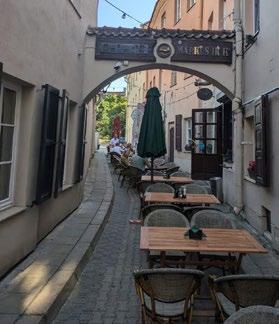
By
Dovilė Čypaitė-Gilė, a cultural historian and PhD candidate at Vilnius University in Lithuania. Her research topic is Jewish Migration from Lithuania 1918–1939: Reconstruction of the Process.
Being a Jewish migration historian, one of my goals during my doctoral studies was to visit the US. Historically, it was one of the most important countries for Jewish migration from Eastern Europe. From the professional perspective, it is the place of networks, rich with academic and cultural heritage institutions. Fortunately, I was granted a short-term research fellowship in New York. It was granted by the Rumsiskes Market-Town Museum Corporation, Fish Center at Yeshiva University and Vilnius University for the research project “Emigration as Everyday Life in Lithuanian Market Towns During 1918-1939.”
The main purpose of the visit to New York was to do research in archives and familiarize with cultural institutions related to Jewish migration and heritage, as well as to consult with experts in the field of Jewish history in Eastern Europe. With the help of Dr. Shay Pilnik I had the opportunity to get consultations from Dr. David Fishman and Dr. Glenn Dynner.
During the fellowship, I was able to research at the YIVO Institute for Jewish Research. It was a very special experience because before the Holocaust, YIVO was operating in Vilnius and was the Eastern European center for Jewish culture and history. What is more, I visited a variety of museums related Jewish culture and history: the Jewish Museum, the Museum of Jewish Heritage, Tenement Museum, among others. Despite only being two weeks, this opportunity gave me knowledge, different perspectives, new connections, and indelible impressions.
I want to thank my PhD supervisor at Vilnius university Dr. Jurgita Verbickienė for encouraging me to participate in this project and helping along the way. A big thank you to Rumsiskes Market-Town Museum Corporation and its chair Mr Eliot Matz for the possibility to come to New York. Finally, my deepest gratitude to the Emil A. and Jenny Fish Center for Holocaust and Genocide Studies and its director Dr. Shay Pilnik for his hospitality, endless consultations on field of Jewish history, for professional and inspiring advises, for planning and supervising my fellowship.



